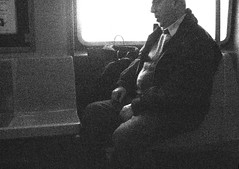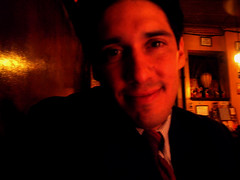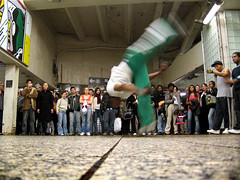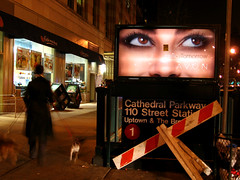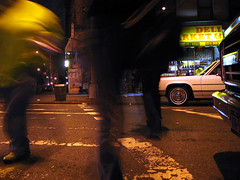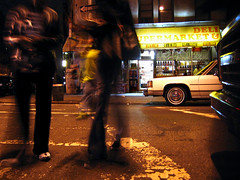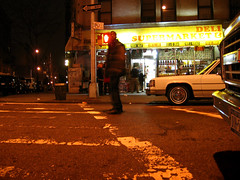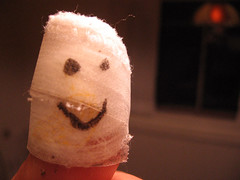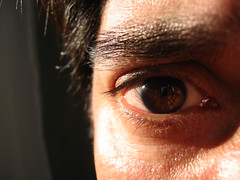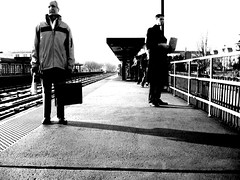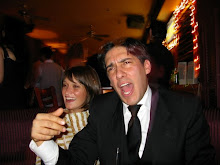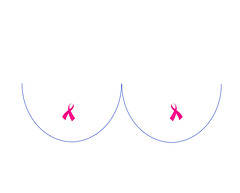
For The Love of All Women('s Breasts)
Originally uploaded by lorenzodom
Playing Trivial Pursuit with Our Souls
Originally tacked onto the end of last night’s post—Buy A Book, Save A Breast—I’ve subsequently separated the following discussion concerning Jane & Phillipa’s argument that women have an Utopian Impulse, and I have added an op-ed I read this morning from one of my favorite trade-rags, Brandweek, “the newsweekly of marketing.”
Let me tell you, the coincidence is truly uncanny.
Please forgive me for doing so, but I’m compelled to render my opinion on ‘Trivial’ Purse-suit? (see below) right here and now:
I find the anthropomorphication of female desire, ego and needs to be frighteningly appalling—or at least, to the extent to which this essay takes it. I winced throughout and, quite honestly, I feel quite sorry for the state of the female psyche if this is what women today truly believe and feel.
Fortunately, I know, as per the opinions of some of my friends that follow, that perhaps the handbag craze is simply a fashion phase that will soon come to pass, alas, much like all the others.
However, knowing this, still does not allay the fear that this is what the average woman is taught and encouraged to feel today.
Regardless of gender, I think it is vital to seek and maintain a balance between the surface that we choose to project and the substance that we make an effort to cultivate within ourselves.
Allowing an accessory (or any material possession for that matter) to determine how we feel about ourselves and convey who we are is a horrifyingly vacuous game of trivial pursuit that women are playing with their souls.
The Utopian Impulse
*In addition to the four codes, Jane and Phillipa argue that women tend to live according to an Utopian Impulse, opposed to the Achievement Impulse that most men follow.
(*Please see Buy A Book, Save A Breast for a discussion on the four codes.)
Following is an interesting excerpt from their book explaining their theory, which I read at lunchtime one afternoon:
Excerpted from Chapter 2: The Male Achievement Impulse and The Female Utopian Impulse
Searching for new answers
In the pursuit of aesthetic perfection and self-enhancement, women are famed for their fickle interest in fads and fashions. For most men, it is utterly bewildering that women will actually throw out an A-line for a Trapeze, just because the magazines tell them to, and will insist that the ‘stony taupe’ is much more on trend in the home than the ‘tawny stone’ (both of which seem exactly the same to the naked eye). To explain the craziness—and we do admit it is totally crazy—you can look to the origins of the word Utopia.
It first occurred in Sir Thomas More’s Utopia, published in Latin in 1516 as Libellus…de optimo republicae statu, deque nova insula Utopia (“concerning the highest state of the republic and the new island Utopia’); it was constructed by More from the Greek words for ‘not’ (ou) and ‘place’ (topos), and thus meant ‘nowhere’.
Therein lies the rub for women. Creating Utopia will always be endless and circular. Perfection is impossible, and the quest for it is therefore often fraught with backward steps and failed experiments. The impulse to continually improve even the tiniest increments and in the most seemingly arbitrary ways overwhelms most women, and results in a daily quest for betterment.
*
After reading this, I immediately proceeded to forward it to about a dozen or so of my closest female friends ranging in age from 20 to 60 years old to solicit their opinions on the theory. Their ethnicities and nationalities included (West and East Cost) Americans, Australian, Brazilian, Canadians, French, Greek, Icelandic, Polynesian, and Portuguese.
Following is a summary of some of their answers. In particular, I asked if this line of thinking applies to how women perceive and pursue “relationships?”
—
Dearest Poet,
What saddens me is the extent to which our world cannot get away from gender projections. I am fully aware of the depth of my own clinging to such mental constructs, but I can assure you that I am working very hard at changing that…
I must run toward the sun, which is the only utopia worth pursuing. I am sad, and a bit disappointed with myself, that at this time I am still living in NYC. I had made plans to exit this town a while ago. I hope those plans, which ought not to be as fanciful as Thomas More’s Utopia, will soon see the light of day.
I hope you are creating and not worrying about “relationships”. That’s for girls!
Love,
Sn
—
Ah yes, women and perfection—always trying to keep up—never managing. Useless pursuit, really, its why I like the sort of women who flip the bird to that sort of thinking and blaze their own paths instead.
Moreover, not a single one of my girlfriends would be idiotic enough to get rid of a perfectly cute A-line dress (think fitted at the top, wide at the bottom) just because trapeze is the new "it" shape of the season. Whatever! As for relationships, ya got me. I can't figure out why anyone, man or woman, does what they do these days...
G
—
My initial reaction is to disagree completely, both because I have never felt "overwhelmed" by an "impulse" to improve, and because I am generally turned off by terms like "most women."
I do always want things to be the best they can be, or at least to be better than they are, but I did not realize that this was distinctly a feminine desire (as opposed to simply a human one).
That said, I would say that this (modified) line of thinking does apply to relationships, but once again, not only to women. For isn't everyone continually seeking the best partner they can attain? Isn’t monogamy when both partners feel they won't do better, or don't want to try? (Right? At least, for me anyway. Because once I realize I can do better, well, I tend to lose interest…)
Oh, and maybe I am the wrong woman to assess this excerpt anyways because I have never in my life (okay, maybe in eighth grade when I was working at being “popular”) taken an interest in fads and fashions. Shit.
Besides, I am beginning to think I am more of a man than a woman in some ways (esp. ‘cause I'm dating a GIRL. Sigh. How do you break up with a girl without making her cry?)
ttys,
Ch
(Note: Her GIRL is a guy, who happens to behave like a gal apparently. Strangely enough, I hear this same lament increasingly these days. There seems to be a lot of traditional gender-role confusion, and woman often complain that their “men” act like women, they’ve got no balls anymore.)
—
Hi L,
This is such a loaded question and I think it all depends on the psyche of each individual woman. Some women do tend to discard relationships with every season, or at least until the relationship no longer serves its purpose. But then again men do the same thing.
It’s only that for a woman she ends up being called a “Man-eater” or “Gold-digger,” whereas a man will be touted as a “Playboy” or “Gigolo”.
Moreover, it’s said that women dress to please men. I see the opposite. Women dress to please other women. It’s akin to subrubanties who have to keep-up-with-the-Jones’. This is the spark that catches fire in the marketplace. This is what drives magazine circulations and makes the makee-up industry a billion dollar business—which both purport and proselytize the idea that you can reinvent or perfect “a better you.”
By the way, I’ll add, the majority of men really don’t have a clue to fashion…
Sh
—
sweet boy:
As for these inane theories on how women preen and nest and are slaves to their bio-clocks and men are hunters or whatever (Men are from Venus and the Women who love too much Just don't understand The Rules...or The Secret, whatever) , I don't have much interest. I know plenty of variations in both men and women, so all the attempts to analyze stereotypes is just kindda stupid (I think), much of like astrology, perhaps as an amusing diversion or ways to have small talk at a boring dinner party, but other than that—a waste of time…
And I don't know anyone who throws their clothes away after reading a magazine—any word on which powerful publication it might be?? I also know plenty of men who spend $5000 on suits and sweat over which type of stitching on their shirts and color of their ties and who flock to the Barney sale, pluck their eyebrows AND are not gay so there..
And no, I don't think this line of thought will help anyone understand what anyone wants from relationships or life. I kind of always think it best to just ask the individual in question rather than read stupid books... But hey, that is just me! And what the f*** do I know…
xo
sa
—
Apparently, I’m living my Utopia because a Zen Buddhist/movie producer recently fell in love with me and asked me to move to Malibu, CA to live with him. He said he would take care of me, that he's rich, and that I would never have to work again...
But he couldn't understand that I moved TO NYC to get AWAY from CA, and that I'd rather live by whatever little bit of money I make off my art, or even just get two or three shitty part-time jobs to scrape by, than to not have to work because someone showers money over me. But it's going in my book because damn it!, this is an amazing story. And I swear it only happens either in the movies-- or in NYC.
So, apparently, for me, NYC (for now) is my Utopia.
Sn
—
I would have to say this line of thinking applies to all thinking women do. That is generally speaking of course. Men, as well as women, need to learn how to pick their battles. The problem lies in that what men and women find inherently important are on two sides of the spectrum entirely.
Pertaining to woman in particular, I don't agree with the whole 'Utopian Impulse', and not that it doesn't exist, I just don't practice it. I once did, and I found it a losing battle. That comes with growth and experience.
Our society to some extent perpetuates this with fairy tales of princesses and traditions of flowing white gowns and happily-ever-after.
Regarding relationships, women need to realize in our day and time, this impulse does not serve us so well. It is a futile pursuit.
I will add, admittedly, I spend a lot of time pondering my apartment’s décor, and yes,
everything matches. Although it's not perfect, I do like the idea of keeping a gracious home, for I am fond of keeping a comfortable, clean and pretty home.
But then again, I happen to only live with another girl, my 9-year-old daughter.
When I lived with her father, he seemed more interested than your normal man in what he
wanted and liked, and so I gave up a lot of girlie things because I understood that it was not only my home, but that everyone that lived in the house had to feel like it was their home too. Anyway, over time I learned to pick my battles…
Ultimately thought, I find that women put too much stock in trying to change and mold a man, and not enough effort into getting down to the bottom line—you can’t change a man, you either love and accept him as he is, with all his faults, or you—CUT HIM LOSE.
B
—
Well, essentially I believe that this kind of marketing messes up women.
Our culture is awful when it comes to teaching women & girls how they should behave and think.
In the name of male-fantasies, we are taught to attack our own bodies, out of a certain hate for what is real. That’s why sadly enough, so many women and girls hate their bodies. In turn, they are afraid of growing older.
Thus, I ask “If she hates herself how can she love?”
This kind of thinking needs to stop.
Love to you,
J
—
Uh, yeah, that's pretty much spot on.
I am ALWAYS buying things for the apartment and on the look out for new and exciting innovations in nail polish, clothing and shoes :) It's not "notable" or "weird" and in my opinion not even worth documenting in a book.. It's just women's natural state to seek betterment—mainly I think because we want the whole world to be better for our children’s sake…And that we like pretty things :)
Hope all is well gorgeous boy…
xxx
Bk
—
To put it mildly, it is so true and so silly how we (women) allow other people to tell us what to wear and what we should do with appearances.
I remember there was a time, many years ago, when the style was only mini dresses. Young and old, good legs or bad, we all had to wear mini. It was so crazy. I remember myself wanting to sabotage the fashion but back then, it would look so strange if one did the opposite.
Well, today things have changed, we can wear mini and midi and maxi and pants and shorts and everything, but still, the young ones would follow the fashion in any way they can. Yes, it is crazy, but it is happening. Maybe with time that too will change. I am glad someone is actually writing about it.
And yes, there is a big correspondence between our pursuit of perfection and how it translates into our relationship with men.
Now that my husband is home all day, I do not understand why he has three pairs of clean pajamas on his bed, why he leaves his jacket on a chair when the wall hanger is much closer to the door, why he mixes all things in the same drawer when it took me so much time to put them nicely, I can go on and on…
Pp
—
Note to Self (only because I think the irony is funny): Of the 12 friends I passed the excerpt on to, 11 responded immediately. The only person who did not respond at all is the one person I'm trying to maintain some sort of "relationship" with.
Huh, I guess that should tell me something...
*
Trivial Purse-suit?
By Tanya Krim
Brandweek, Out of the Box, Insights into what consumers are thinking, how they’re acting and why, March 26, 2007
NEW YORK -- I am fond of quoting the adage "Diamonds are a girl's best friend." However, I recently had the privilege of conducting a qualitative research study on another topic that's near and dear to my heart: handbags.
As a result, I have come to realize that handbags can be considered—together with diamonds—one more indispensable member of a female's close coterie.
Walking around various high-end stores in upscale Bergen County, N.J., I could not help but marvel at the diversity of the women looking for their expensive handbag "fix": regardless of age, income or career path, women today certainly seem to understand that a beautiful, high-end pocketbook can simultaneously give them the emotional high they yearn for and telegraph to their female peers that they have class, taste and a hip sense of style.
In 2005, handbags (aka purses and pocketbooks) dominated the U.S. accessories market, accounting for more than $5 billion in sales. Consumer research from Mintel finds that British women are becoming increasingly enamored with their handbags as sales there grew by 146% between 2000 and 2005 to reach an estimated $680 million (or £350 million).
Functionally, a handbag transports a woman's essential daily items. Emotionally, however, it perhaps plays a more powerful role. Oddly, current advertising for the category does not focus on the emotional threads that often tie women to their purses.
Handbags are a form of identity and individuality, and, like the women who carry them, they may or may not have multiple identities. Regardless of whether a purse acts as a mini-office, pharmacy, snack bar, mobile beauty salon, family photo gallery or a combination of all of the above, it is also a beloved and trusted accessory that reflects a woman's specific personality or provides a glimpse at the one she aspires to project.
Handbags can also instantly telegraph messages about a woman's mindset, mood or life stage. The person pushing a pram and carrying a large, practical black handbag might be resigned to the fact that her handbag screams out "Responsible Mother" rather than "Trendy Young Woman"; nonetheless, she knows that this is the one she needs because she is in her maternal mode life-stage.
A handbag can also reveal whether a woman is into power and status, glamour and luxury or fun and fantasy, and using it to make a fashion statement is unquestionably appealing to women.
Regardless of its exterior, a handbag's contents generally reveal the owner's true essence and soul. What is on the outside of the bag may separate one woman from another, but what is inside may unite them; a peek may reveal whether a woman is feeling overwhelmed and chaotic, or together and in control. In fact, many women seem to have a relationship with their bag that is similar to the one they have with a dependable and trustworthy female friend/confidante: it knows everything about her and her life.
On some occasions, however, it is undeniable that handbags appear to be more like good-looking, desirable men than close female friends as they become objects of women's deep-seated, unbridled lust.
According to my research, women view their handbag as their one-and-only real personal space, a kind of safe haven and security blanket that keeps them from feeling naked and vulnerable. It carries all the items they need or might need, and as a result of this, is synonymous with feelings of warmth, safety and togetherness.
Interestingly, women also perceive handbags to be the one and only fashion item that does not discriminate against them based on looks, size or age. While they may feel too old for certain styles of clothing or shoes, most women believe that they have more leeway with crossing the young-old lines with a trendy bag.
The emotional territory surrounding the pocketbook category is clearly enormous. Nonetheless, most women I spoke to for my study readily testified to the dearth of emotion visible in contemporary handbag advertising.
In today's world, handbag advertising tends to consist of print rather than TV. Although there are undoubtedly numerous handbag print ads to be found in glossy women's magazines and other upscale general interest titles, these communications are not really very differentiated from each other.
Female consumers recalled that all purse print ads feature the handbag brand's logo and iconography as well as beautiful, thin women with perfect hair—usually alone on the page with the product. The eye-catching, desirable handbag is usually displayed dangling off a long, elegant arm or shoulder, or alongside a pair of flawless legs perched in an enticing pair of shoes. The images are unquestionably eye-catching and telegraph—albeit only via visual cues—product usage mood as well as easy-to-comprehend messages about it: "If you buy this glamorous, sexy little evening bag, you, too, will get noticed/feel sexy and beautiful." Or, "You will have fun if you buy me!"
Women admitted that they often lust after the bag as well as the pair of shoes they see promoted in these advertisements because they look stylish, sexy and eye-catching. However, as yet, no one brand of handbag appears to have differentiated itself in a relevant and memorable way by using imagery, words or an insightful tagline that show that the brand really "gets" how women feel psychologically and emotionally about these accessories. No manufacturer seems to be trying—directly and overtly—to move away from merely grabbing a share of wallet and focusing more on grabbing a share of heart.
Even the Manolo Blahnik handbag brand hasn't achieved relevant differentiation in the minds of many consumers. This, in spite of the fact that Manolo Blahnik shoes became differentiated years ago because of their cult status among celebrity fans and a frequent presence in Sex and the City episodes.
It is interesting that the status of handbag advertising today seems to be somewhat comparable to that of shoe print advertising: the lack of emotion in campaigns for these products is perhaps all the more surprising as both handbags and shoes are perceived by women to have particularly enticing and alluring DNA that could be used to generate highly emotive and creative advertising.
There appears to be a huge opportunity for a popular handbag brand to be the first to market with a campaign that layers on more meaning and emotion, and moves away from the tried and true "product is hero" formula. An ambitious handbag manufacturer might even try to position itself as the "look good, feel good" brand for females rather than just contenting itself with being in the "stuff storage" business.
The possibilities for the development of emotionally resonant handbag advertising are endless. A brand might wish to position itself as the one that really "gets" that handbags are a woman's most-trusted accessory and ally; or it might want to convey that it's the ultimate lust-inducing object, a can't-live-without-it organizer or the quintessential pick-me-up purse.
Then again, handbag marketers might strike that emotional chord by positioning a purse as the one that can help a teenager feel sophisticated or an older woman recapture a slice of her youthfulness.
Teens already seem to be gravitating to certain brands—such as Coach and Betsey Johnson—and sticker shock doesn't seem to be an object.
For an older woman, the reality is that no matter how much she notices the appearance of crow's feet ’round her eyes, how desperately unhappy she feels about the collection of unappealing extra pounds on her hips or the discomfort caused by those pointy, sexy shoes she used to strut around in quite happily, a handbag can transport her back to more youthful, carefree days. It can help her telegraph to the world that while she has the experience of years, she is still proud to retain that enviable youthful sparkle.
Lockheart, a California-based handbag brand that launched in July 2006, and which is available in boutiques and upscale department stores including Nordstrom, offers women beautiful, eye-catching, romantic-looking handbags. The price point is quite high, although brandishing one of these pieces on your arm is an uplifting experience: I know, because I have one! [Ed. note: Lockhart is not one of Krim's clients.] Maybe this will be the upstart brand that begins to shake up the category?
The fact is that handbags and women have a close-knit, warm and satisfying relationship. In today's often lonely, frightening and disappointing world, advertising that capitalizes on the "look good, feel good" aspects of life is likely to resonate particularly well with women. Because, no matter how intelligent, profound and analytical we are, we still also long to score points on the got-it-going-on-ometer!
